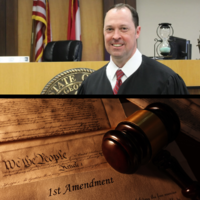Free Speech Alive And Well In Cobb
Superior Court Strikes Down Defamation Suit Over Campaign Website
It was the second defamation suit filed in less than six months by the same plaintiff, Christopher Curry, against the same defendants for alleged defamatory accusations on the mcmasterforcobb.com website. The original lawsuit was filed in Cobb County Superior Court on August 17, 2022 against former Superior Court Judge candidate Matt McMaster, his law firm, and his campaign entity, McMaster For Cobb LLC and was voluntarily dismissed by Curry on December 2, 2022–less than one week from the day the case was set to be heard before the Honorable Henry R. Thompson. Curry then filed the second defamation suit against the same parties on December 8, 2022. The irony: Curry’s name does not appear anywhere in the article complained of. Rather, Curry’s attorney Michael Kramer insisted that because the site had a link to a court document which included Curry’s name on it 14 times, the article itself was defamatory to Curry even without his name included. The court, however, never reached the issue of whether Curry could be “defamed by reference” as argued because Curry could not prove other material elements for his case to pass Constitutional muster against McMaster’s anti-SLAPP motion.
The Ghost Allegations
Plaintiff Christopher Curry alleged that the defendants, Matthew D. McMaster, Matthew D. McMaster LLC and McMaster For Cobb LLC (collectively referred to as "McMaster") accused Curry of committing statutory rape and of being "dangerous" in McMaster’s article entitled Why I’m Running. McMaster filed an anti-SLAPP motion to strike Curry’s complaint on December 16, 2022, and the case was set down for a hearing on February 15, 2023.
The Hearing
At the hearing on McMaster’s anti-SLAPP motion, Curry’s attorney argued that the alleged accusations against Curry of statutory rape and of being “dangerous” constituted libel per se. Libel per se under Georgia law requires a "charge that one is guilty of a crime, dishonesty or immorality."[1] However, not only was the article completely void of Curry’s name, no accusation of statutory rape could be pointed to by Curry’s attorney.
"I won the case by results only" McMaster stated after the hearing. "I can’t say that my presentation had much to do with it." McMaster continued: "At the end of the day, the record simply showed that the facts and the law were on my side and that became more and more apparent the more the opposing counsel spoke. It was really a ridiculous case to have to defend against, and I felt Judge Thompson took it seriously but also with some tongue-in-cheek humor." McMaster didn’t elaborate on that but some excerpts of Judge Thompson’s interrogation of plaintiff’s counsel from the hearing shed some light on McMaster’s comment:
JUDGE THOMPSON: Do you think the word "dangerous" is libelous in and of itself?
PLAINTIFF'S ATTORNEY: In and of itself?
JUDGE THOMPSON: Mmm hmm.
PLAINTIFF'S ATTORNEY: No context at all? . . . Dangerous, no context at all--is that what you're asking me?
JUDGE THOMPSON: Yah.
PLAINTIFF'S ATTORNEY: No.
JUDGE THOMPSON: Okay. Let's go back to that era of human development that historians like to call "The Day." Ted Nugent wrote and recorded a song about his girlfriend. The title was "Little Miss Dangerous." Did he libel his girlfriend?
PLAINTIFF'S ATTORNEY: Ain't no doubt Teddy whips it out. That Ted Nugent?[2]
JUDGE THOMPSON: That guy. Yah.
PLAINTIFF'S ATTORNEY: I'd have to hear the whole song. I don't know the song.[Laughing] Can you play it for me?
JUDGE THOMPSON: No. Let's uh, let's go to the other side of the record store. In the early 80s.
PLAINTIFF'S ATTORNEY: There ain't record stores anymore.
JUDGE THOMPSON: Well, let's pretend we are back in 1984. There was an album called "Ice Cream Castles" released by the band called "The Time," lead singer Morris Day.
PLAINTIFF'S ATTORNEY: Morris Day and The Time?
JUDGE THOMPSON: Morris Day and The Time. The song "Jungle Love."
PLAINTIFF'S ATTORNEY: Yah.
JUDGE THOMPSON: First verse-- "I, I've been watching you. I think I wanna know ya, know ya. I said I, I'm a little dangerous. Girl I'd love to show ya, show ya . . . Jungle Love . . . [Inaudible][Laughing from courtroom audience]. Are we at a point of human development in America where the word "dangerous" is libelous or is it a compliment in some aspects? Of course Day is complimenting himself.
PLAINTIFF'S ATTORNEY: Okay. Again, you asked me the question if-- if you take the word dangerous out of context and just put dangerous, is it libelous? No . . . .
The Right Result
Despite his humorous dialogue, the Honorable Henry R. Thompson didn’t joke around with our First Amendment Rights under the Constitution; the plaintiff’s complaint against McMaster was stricken and the case dismissed.[3] Free Speech is alive and well in Cobb.
By Andy Lee White
Coauthor of Atlanta Pop in the '50s, '60s & '70s: The Magic of Bill Lowery
February 24, 2023
References
- ↑ Barber v. Perdue, 194 Ga.App. 287, 288, 390 S.E.2d 234, 235 (1989)
- ↑ An apparent modified quote from the song Free-For-All by Ted Nugent (1976)("When in doubt I whip it out")
- ↑ Order On Defendants' Anti-SLAPP Motion To Strike
